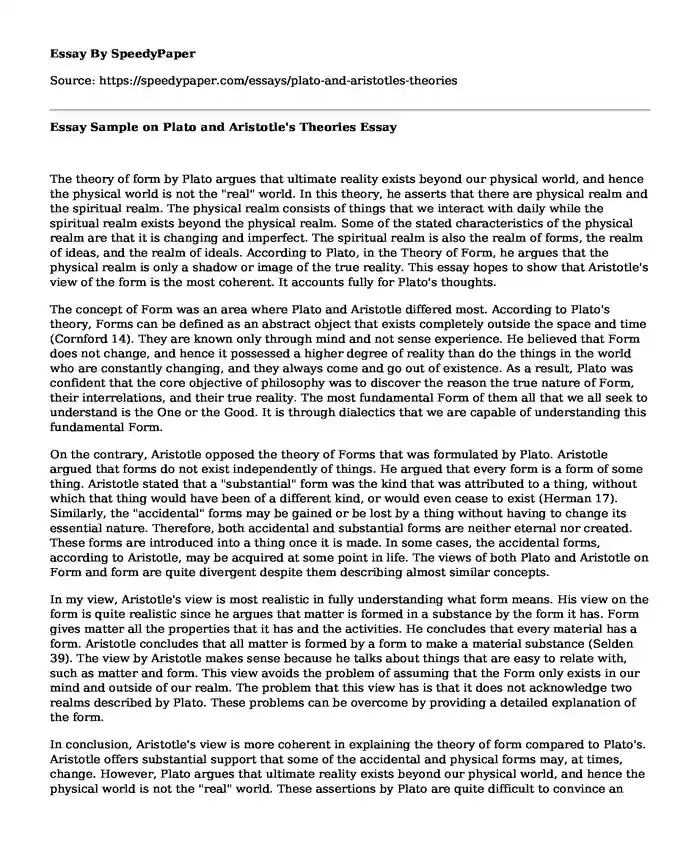
| Type of paper: | Essay |
| Categories: | Philosophy Plato |
| Pages: | 3 |
| Wordcount: | 687 words |
The theory of form by Plato argues that ultimate reality exists beyond our physical world, and hence the physical world is not the "real" world. In this theory, he asserts that there are physical realm and the spiritual realm. The physical realm consists of things that we interact with daily while the spiritual realm exists beyond the physical realm. Some of the stated characteristics of the physical realm are that it is changing and imperfect. The spiritual realm is also the realm of forms, the realm of ideas, and the realm of ideals. According to Plato, in the Theory of Form, he argues that the physical realm is only a shadow or image of the true reality. This essay hopes to show that Aristotle's view of the form is the most coherent. It accounts fully for Plato's thoughts.
The concept of Form was an area where Plato and Aristotle differed most. According to Plato's theory, Forms can be defined as an abstract object that exists completely outside the space and time (Cornford 14). They are known only through mind and not sense experience. He believed that Form does not change, and hence it possessed a higher degree of reality than do the things in the world who are constantly changing, and they always come and go out of existence. As a result, Plato was confident that the core objective of philosophy was to discover the reason the true nature of Form, their interrelations, and their true reality. The most fundamental Form of them all that we all seek to understand is the One or the Good. It is through dialectics that we are capable of understanding this fundamental Form.
On the contrary, Aristotle opposed the theory of Forms that was formulated by Plato. Aristotle argued that forms do not exist independently of things. He argued that every form is a form of some thing. Aristotle stated that a "substantial" form was the kind that was attributed to a thing, without which that thing would have been of a different kind, or would even cease to exist (Herman 17). Similarly, the "accidental" forms may be gained or be lost by a thing without having to change its essential nature. Therefore, both accidental and substantial forms are neither eternal nor created. These forms are introduced into a thing once it is made. In some cases, the accidental forms, according to Aristotle, may be acquired at some point in life. The views of both Plato and Aristotle on Form and form are quite divergent despite them describing almost similar concepts.
In my view, Aristotle's view is most realistic in fully understanding what form means. His view on the form is quite realistic since he argues that matter is formed in a substance by the form it has. Form gives matter all the properties that it has and the activities. He concludes that every material has a form. Aristotle concludes that all matter is formed by a form to make a material substance (Selden 39). The view by Aristotle makes sense because he talks about things that are easy to relate with, such as matter and form. This view avoids the problem of assuming that the Form only exists in our mind and outside of our realm. The problem that this view has is that it does not acknowledge two realms described by Plato. These problems can be overcome by providing a detailed explanation of the form.
In conclusion, Aristotle's view is more coherent in explaining the theory of form compared to Plato's. Aristotle offers substantial support that some of the accidental and physical forms may, at times, change. However, Plato argues that ultimate reality exists beyond our physical world, and hence the physical world is not the "real" world. These assertions by Plato are quite difficult to convince an individual that they are true.
Works Cited
Cornford, Francis MacDonald. Plato's cosmology: the Timaeus of Plato. Routledge, 2014.
Herman, Arthur. The cave and the light: Plato versus Aristotle, and the struggle for the soul of western civilization. Random House Trade Paperbacks, 2014.
Selden, Raman. The theory of criticism: from Plato to the present: a reader. Routledge, 2014.
Cite this page
Essay Sample on Plato and Aristotle's Theories. (2023, Apr 03). Retrieved from https://speedypaper.net/essays/plato-and-aristotles-theories
Request Removal
If you are the original author of this essay and no longer wish to have it published on the SpeedyPaper website, please click below to request its removal:
- Essay Sample on Dabbawala Organization
- Essay Sample in History: Latin American Revolutions
- Corporal Punishment in Schools - Argumentative Essay Example
- Free Litterary Essay: Characterization in Drama
- Essay Sample: Behavioral and Contingency Theories of Leadership
- Essay Sample Focusing on Gender Inequality in Popular Culture
- Essay Example on the Arctic Versus Antarctic
Popular categories




